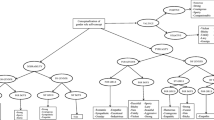Abstract
This study examined children’s evaluative stereotypes of masculine, feminine, and androgynous first names. Attractive and unattractive masculine, feminine, and androgynous first names were presented to 50 primary school children. The gender-typed names were attributed to the appropriate sex; the androgynous names were repeated and attributed to both sexes. Participants were required to evaluate the names using a series of 20 bipolar adjectives that were later summed to give an overall evaluation score. Results showed that evaluations were significantly influenced by the gender typing of the names and the sex of the participants but not by the attractiveness of the name. The results are discussed in terms of existing research and theory.
Similar content being viewed by others
References
ALBOTT, W. L., & BRUNING, J. L. (1970). Given names: A neglected social variable. The Psychological Record, 20, 527–533.
BROOM, L., BEEM, H. P., & HARRIS, V. (1955). Characteristics of 1,107 petitioners for change of name. American Sociological Review, 30, 32–39.
BUSSE, T. V., & HELFRICH, J. (1975). Changes in first name popularity across grades. The Journal of Psychology, 89, 281–283.
BUSSE, T. V., & SERAYDARIAN, L. (1978). Frequency and desirability of first names. The Journal of Social Psychology, 104, 143–144.
COLMAN, A. M., HARGREAVES, D. J., & SLUCKIN, W. (1981). Preferences for Christian names as a function of their experienced familiarity. British Journal of Social Psychology, 20, 3–5.
ERWIN, P. G. (1993). Friendship and peer relations in children. Chichester: Wiley.
ERWIN, P. G. (1995). A review of the effects of personal name stereotypes. Representative Research in Social Psychology, 20, 41–52.
ERWIN, P. G., & CALEV, A. (1984). The influence of Christian name stereotypes on the marking of children’s essays. British Journal of Educational Psychology, 54, 223–227.
GARWOOD, S. G. (1976). First-name stereotypes as a factor in self-concept and school achievement. Journal of Educational Psychology, 68, 482–487.
GARWOOD, S. G., BAER, S., LEVINE, D., CARROLL, S., & O’NEAL, E. (1981). Sex role expectations of socially desirable first names. Sex Roles, 7, 257–262.
GLADDING, S. T., & FARRAR, M. K. (1982). Perceptions of common and unusual first names of therapists. Psychological Reports, 50, 595–601.
HARGREAVES, D. J., COLMAN, A. M., & SLUCKIN, W. (1983). The attractiveness of names. Human Relations, 36, 393–402.
HARTMAN, A. A., NICOLAY, R. C., & HURLEY, J. (1968). Unique personal names as a social adjustment factor. The Journal of Social Psychology, 75, 107–110.
HENSLEY, W. E., & SPENCER, B. A. (1985). The effect of first names on perceptions of female attractiveness. Sex Roles, 12, 723–729.
JOUBERT, C. E. (1983). Unusual names and academic achievement. Psychological Reports, 53, 266.
JOUBERT, C. E. (1985a). Sex differences in given name preferences. Psychological Reports, 57, 49–50.
JOUBERT, C. E. (1985b). Factors related to individuals attitudes toward their names. Psychological Reports, 57, 983–986.
LAWSON, E. D. (1984). Personal names: 100 years of social science contributions. Names, 32, 45–73.
LEIRER, V. O., HAMILTON, D. L, & CARPENTER, S. (1982). Common first names as cues for inferences about personality. Personality and Social Psychology Bulletin, 8, 712–718.
MCDAVID, J. W., & HARARI, H. (1966). Stereotypes of names and popularity in grade-school children. Child Development, 37, 453–459.
SADOWSKI, C. J., WHEELER, K. J., & CASH, M. (1983). Unusual first names and achievement among male psychologists. Journal of Social Psychology, 119, 181–185.
SAVAGE, B. M., & WELLS, F. L. (1948). A note on singularity in given names. The Journal of Social Psychology, 27, 271–272.
SERAYDARIAN, L., & BUSSE, T. V. (1981). First-name stereotypes and essay grading. The Journal of Psychology, 108, 253–257.
STRUMPFER, D. J. W. (1978). Relationship between attitudes toward one’s names and self-esteem. Psychological Reports, 43, 699–702.
TOMPKINS, R. C., & BOOR, M. (1980). Effects of students’ physical attractivensss and name popularity on student teachers’ perceptions of social and academic attributes. The Journal of Psychology, 106, 37–42.
WALDROP, M. F., & HALVERSON, C. F. (1975). Intensive and extensive peer behavior: longitudinal and cross-sectional analyses. Child Development, 46, 19–26.
WEST, S. G., & SHULTS, T. (1976). Liking for common and uncommon first names. Personality and Social Psychology Bulletin, 2, 299–302.
WRIGHT, F. W. (1954). Fashions in girls names at Smith College. Names, 2, 166–168.
ZAJONC, R. B. (1968). Attitudinal effects of mere exposure. Journal of Personality and Social Psychology, 9, 1–27.
ZWEIGENHAFT, R. L. (1977). The other side of unusual first names. The Journal of Social Psychology, 103, 291–302.
ZWEIGENHAFT, R. L. (1981). Unusual names and uniqueness. The Journal of Social Psychology, 114, 297–298.
Author information
Authors and Affiliations
Corresponding author
Rights and permissions
About this article
Cite this article
Erwin, P.G. Children’s Evaluative Stereotypes of Masculine, Feminine, and Androgynous First Names. Psychol Rec 56, 513–519 (2006). https://doi.org/10.1007/BF03396031
Published:
Issue Date:
DOI: https://doi.org/10.1007/BF03396031




